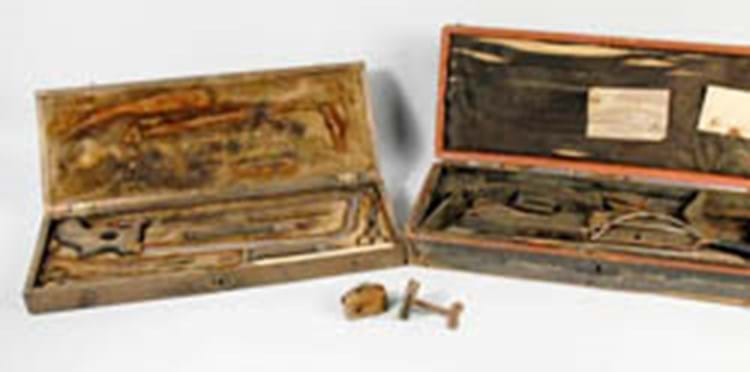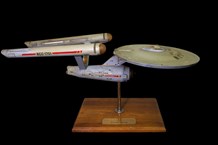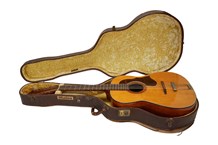
Lost for a century, they resurfaced alongside a major collection of antique medical apparatus in a disused warehouse in New England two decades ago.
On October 15-16, Grogan & Co. of Dedham, Massachusetts will offer as a single lot the collection of 18th and 19th century surgeons' kits and a tourniquet belonging to three members of a prominent family of Boston physicians.
Of key importance is the amputation set c.1775 with a label reading Used during the Revolutionary War by Dr John Warren and another in a fish skin case given to him by his older brother, General Joseph Warren, a fellow doctor who died from gunshot and bayonet wounds at the Battle of Bunker Hill.
The Warren instruments, hailing from a time before the importance of sterilisation was known to doctors, all show signs of heavy use. Remarkably, adding to their 'time capsule' quality, the remnants of layers of dried blood remain.
Dr John Warren became a prominent figure during the Revolutionary War. A 22-year-old surgeon with Colonel Pickering's Colonial Regiment in Salem, he was promoted by General George Washington to senior surgeon of the Continental Army in Cambridge after the British burned Charlestown. He tended to the wounded on the battlefields of Long Island, Trenton and Princeton, seeing his last field action at the Battle of Quaker Hill in Newport, Rhode Island in 1778. He was discharged from the army two years later when he founded the first Boston Medical School (his friend Paul Revere engraved a diploma certificate), becoming the first Professor of Anatomy and Surgery at Harvard Medical School in 1782.
A catheter set (by 19th century maker Charrière of Paris) belonging to his son John Collins Warren (1788-1856) and a Charrière surgical kit owned by the noted Boston surgeon Dr Henry J. Bigelow (1818-1890) are also included in the lot.
A pioneer in ether anaesthesia, the papers of John Collins Warren survive in the collection of the Massachusetts Historical Society. An entry in his diary dated February 19, 1850 recalls the loan of his father's Revolutionary War surgeon kits to Dr Bigelow, a close family friend and colleague and a collector of medical antiques.
The whereabouts of the Bigelow collection remained a mystery from the time of the death of his son Warren in 1926 until a large cache of 18th and 19th century medical apparatus was unearthed in an abandoned storage unit in the early 1990s. Two decades later, these four surgeon sets will appear for sale with an estimate of $30,000-50,000.
By Roland Arkell




